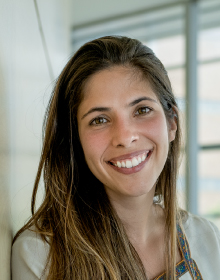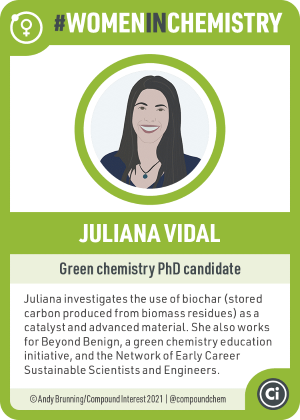Positive Reaction

Moving abroad for grad school can be tough, recent PhD graduate Dr. Juliana Vidal had nothing but good things to say about her experience.
In 2017, Juliana Vidal moved here from Brazil to pursue a PhD in green chemistry. Four years later, Juliana has completed her program. She says it was an enjoyable experience, even if she had a few struggles along the way. While she was prepared to tackle the challenge of learning to speak English fluently, navigating graduate studies in the middle of a pandemic was something she hadn’t anticipated.
Juliana and her husband went to Brazil to visit family just before the pandemic hit in early 2020. Due to the worldwide shutdown of air travel, she was unable to return to Memorial University to finish her work for nearly five months. She spent that time writing her thesis, collaborating virtually with her various volunteer efforts, and spreading awareness about the positive impact of green chemistry.

Outside of her studies, Dr. Vidal is the director of Marketing and Communications at the Network of Early-career Sustainable Scientists and Engineers. She also volunteers her time with Beyond Benign, an organization dedicated to equipping educators with the tools, training and support needed to promote green chemistry within chemistry education. These initiatives give her room to flex her communication muscles and to bring awareness about green chemistry to a wider audience. She has a flair for using empathy and human connection to translate complicated concepts into relatable material. This skill helped her earn first place in the Royal Society of Chemistry’s 2021 poster contest. Together, her talents, scholarly pursuits and dedicated volunteer efforts have earned her an industry trading card – an honour that celebrates her as one of the formidable women working in chemistry today.
Who are you?
I was born and raised in the city of Juiz de Fora, in the state of Minas Gerais, Brazil. I used to live with my parents, and my life was pretty normal. VERY normal, actually. Three years ago, I got possessed by the “there’s got to be something more out there” feeling, and I decided it was time for me to begin a new chapter in my life. I needed to start my own adventure and experience the world, so I traveled to Japan and then moved to Canada. In the first few years, the “something more out there” was definitely too much. Why did I get possessed by that feeling? The cold, the new language, the different culture, the food, (did I say cold?). Every single small little tiny thing was a big challenge, and sometimes I thought I could not handle this adventure. Well, if you are constantly overcoming challenges, at some point, they stop being scary and big, and just become something else you need to do. Also, little I knew when I started this adventure the support I would have. All the support in the world! From my family, my friends, my new friends, and my new family. I am forever thankful for having the chance to interact with and learn from the inspiring and amazing people I have met. So, to finally answer the very simple question above, I can say that I’m Juliana Vidal, a person that tries to do some yoga every now and then, likes videogames, hates vegetables, loves dogs, and wants to keep supporting and encouraging people to be kind to each other and get out of their comfort zones.
What program did you come to Memorial to complete?
I have completed my PhD studies in chemistry.
Who was your supervisor?
My supervisor was Dr. Francesca Kerton, from the Department of Chemistry at Memorial University (St. John’s, NL) and my co-supervisor was Dr. Stephanie MacQuarrie, from Cape Breton University (Sydney, NS).
What was your research/thesis about?
In my PhD research, I studied different applications for a material obtained from wood waste. Tons of wood residues are produced every year here in Canada, and although they might seem inoffensive at first, their decomposition releases greenhouse gases to our planet, contributing to climate change. However, if this waste is burned under special conditions (i.e. without oxygen) a material called biochar is produced, and this is what we studied. Biochar can play a role in mitigating climate change effects, and also presents desired chemical properties for various applications. We have shown that biochar can help to produce chemicals that are used industrially, and biochar can also produce polymers from renewable feedstocks (instead of using petroleum sources) that degrade in our environment.
What was the goal of your research? What are the implications of your research project for the province, the country and the world?
The goal of my research was to invite people to think and re-think about waste. Do we really need to live in a society where we produce things that we know are going to be thrown away? Where does all of our waste end up? What are the environmental impacts of managing and dealing with all this waste generated? With my PhD work, the idea was to show that it is possible (and necessary) to change the concept and definition of waste. We must design our processes and manufacture our products in a way that the waste produced is now a feedstock for the design of other processes and the fabrication of other products. For us to achieve a truly sustainable future, as chemists, we need to always consider the impact of our processes and products on human health and the environment, which is the basics of a field known as green chemistry. The idea of practicing and implementing green chemistry is completely tied up to the Sustainable Development Goals (SDGs) created by the United Nations. The SDGs are a universal call to protect our planet, end poverty, and promote peace by 2030. Green chemistry can work at the molecular level to help and tackle some of those objectives, including the achievement of good health and well-being, responsible consumption and production, and climate change. Therefore, the implications of my research for the province, the country, and the world include the continuous search (and hopefully achievement) of a brighter, greener, and more sustainable future for us and the other generations.
Have you received any awards, scholarships or honours?
In 2018, I received the Dr. Liqin Chen Scholarship in Chemistry and the J. Beryl Truscott Graduate Scholarship from Memorial University. At the end of the year, I won an Honorable Mention during the “Tell a Story about Green Chemistry” Video Competition organized by the Centre for Green Chemistry & Engineering at Yale. In 2020, I was nominated the Canadian Delegate for the First Commonwealth Chemistry Congress organized by the Commonwealth Chemistry, and I was nominated a Chemical Abstracts Service (CAS) Future Leader by the American Chemical Society.
Check out the video below to hear more from Juliana about her time as a student at Memorial.